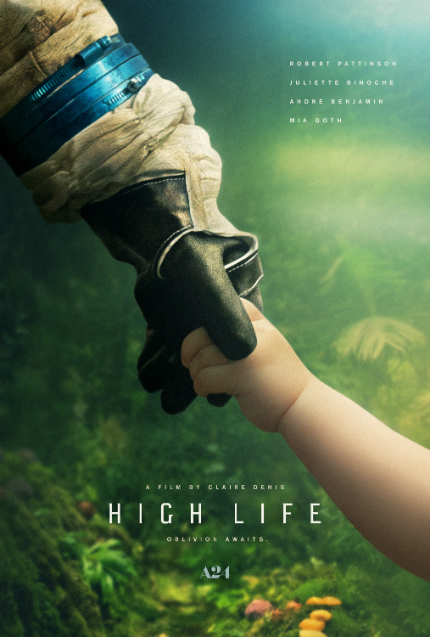Review: Claire Denis' HIGH LIFE, In Space, Still Against Type
Robert Pattinson, Juliette Binoche, Mia Goth and André Benjamin star in director Claire Denis' first foray into science-fiction territory.

Space is dark, a blackness that you cannot even imagine. And it is silent. Not middle-of-nowhere silent where there is still the occasional breeze that moves the sand or a sense of the air or sun which seems to have its own sonic frequency. I mean that vacuum silence, the one where even a scream would disappear.
So what does one do, when one is alone, trapped in a metal container, with only a child for company, knowing that there isn’t going to be any change in circumstance? When your memories are most unpleasant, to put it mildly, and nothing in your life has prepared you for being a parent, let alone a single parent, completely alone?
High Life is French auteur Claire Denis’ first English-language film, and also her first science fiction film. Not that she is a stranger to different genres, having tackled horror in Trouble Every Day, and crime thriller in Bastards. But of course, this being Denis, it’s always going to go against-type, as much exploring the basic instincts and desires of humans, like food, alcohol, sex, and love, than whether the computers are going to kill us all. So it is with High Life, where she puts together an unlikely group of people to see where their natures take them.
Monte (Robert Pattinson) is the sole crew member on a spaceship that’s on a one-way mission to a black hole far past our solar system. His only daily tasks are looking after the garden, and tending to his baby daughter, Willow, who was born on board.
It turns out, Monte was part of a group of some of the worst young criminals, who were given a chance to avoid death row by going into space and taking part in a fertility experiment, conducted by fellow criminal and doctor, Dibs (Juliette Binoche). As Monte keeps a mundane but not entirely unhappy daily routine, he recollects the ragtag group of men and women who used to journey with him, and how they slowly succombed to the psychological stress of life on the ship.
There is a catch: Monte must submit a report every 24 hours in order to renew life support, sending these reports to a place on earth that might not even exist anymore, even if they could be received. So it would be easy enough for him to be done with it, to go to sleep one night with Willow and never wake up. But he has found a rhythmic, lyric poetry in his daily life, raising his daughter, in a peace that can only come when the shadows of the world have disappeared.
But he still recollectes the other kind of life, the other kind of poetry that he had when the ship was full. But it was not lyric: it was raw and sensual and violent, as the people on the ship, connected only by their criminal pasts, were forced together. Again, here Denis goes against expectation: rather than a constant bacchannal of food, sex, and blood, she parses out these moments, making them all the more powerful. It’s the lustful stare that might lead to an attack on an unsuspecting crewmate, or a longing to return to the earth that leads to self-imposed isolation.
There is even a specified room for them to live out their carnal desires alone, with a particular scene with Binoche that is best left for the viewer to discover; needless to say, it’s Denis-style eroticism at its most sweaty and sinewy, a moment that could only be filmed by a woman director that encompasses the gaze of any and all genders. Though not all sexual encounters are so desired, as two separate scenes of sexual violence might be give a few viewers pause.
Pattinson is well-suited to Monte, who is quiet, stoic, celibate (both by choice and eventually by circumstance), and apparently the only one capable to adapting to this strange life of crossing the void. His love and care for his daughter is shown in his tenderness towards her. Each of the other characters represents something elemental: despondancy from one, sexual rage from another, and to be noted, André Benjamin as one of Monte's fellow criminals, who seems to find a peace early that extends to Monte and guides him once he is alone.
Yorick Le Saux's sparse cinematography moves from the stark, harsh, bright corridors of a ship that can becomes an odd substitute for a home, clinical and yet with the layers of dust and grime building, and the sensuousness of the few intimate moments. Stuart A. Staples score gives the film its odd, somewhat experimental feel, the experiment on both the crew and on the audience, enveloping this environment that no human was really meant to inhabit.
High Life reveals its secrets in this slow-burn, disjointed, yet perfectly tuned narrative; in the darkest corner of space, in the emptiness between the stars, and in the small circle of love and perhaps some strange hope that Monte creates, once free from the pressures and commitments of other humans and the impositions of their desires.
Review originally published during the Toronto International Film Festival in September 2018. The film will open in select U.S. theaters on Friday, April 5, 2019, via A24 Films.







